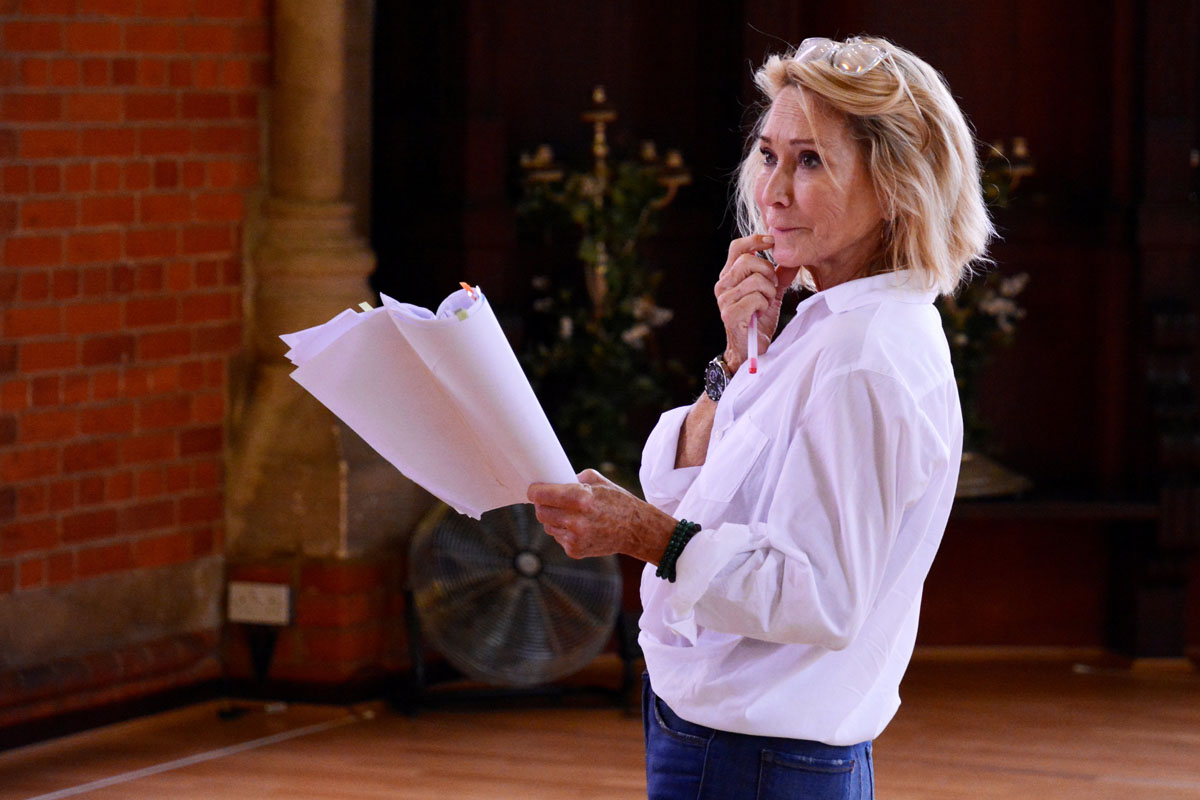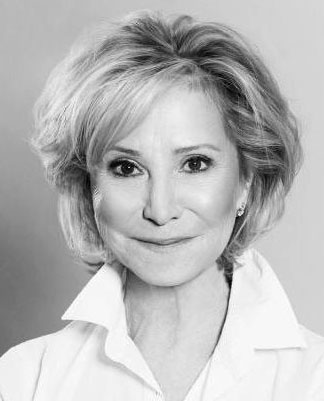 Felicity Kendal in rehearsal for A Room with a View. Photo by Nobby Clark
Felicity Kendal in rehearsal for A Room with a View. Photo by Nobby Clark
Felicity Kendal is appearing as Charlotte Bartlett in A Room with a View at the Theatre Royal in Bath from 28th September to 8th October prior to a UK tour. Here she talks about the play and her role in it.
How would you sum up the character of Charlotte Bartlett?
She’s a very complicated lady. On the surface she’s an obvious spinster – she’s not married and she’s a chaperone and also rather nervous. But with [director] Adrian Noble’s help we’re finding a much more complicated person who if she lived now would have a very different life. That’s what’s interesting about the play; in the time when this story is set – and E.M. Forster was obviously writing about what were for him modern times when he wrote it – was completely different for women. The possibility of how they would live without structure and support of a man in society was completely different to what it is now and that’s what is absolutely fascinating about it. Charlotte’s life is dictated by the time she is living in. The great suffragette movement was just beginning then. It was a huge change happening and she was not a woman who was able to overcome her mistake in the world, if you like. There’s obviously some history she’s had that has made it impossible for her to get married, which means she has no standing in the world at all and very little money.
Do you have anything in common with her?
[Laughs] Yes, absolutely – browbeaten, you know, and single… No, one of the reasons I’m an actor is because I want to go into worlds that don’t resemble my own life and my own world. Of course you have to draw on different aspects of yourself because characters have to be real and you have to understand them, so if you can’t put yourself in their place you can’t convince the audience it’s really happening to you. But I’ve never been someone who says ‘I want to play that part because it’s just like me and I understand it’.
What do you most relish about playing the character?
The fact that she is on the surface very timid but underneath in her own way finally very brave. E.M. Forster writes these incredible characters that are very rounded and I think the complexity of this character is what I’m really looking forward to delving into and the different layers. You think she’s one thing and she thinks she’s one thing, then she finds that actually she’s stronger and braver than she thought.
Can you recall when you first read the book?
I read Forster’s books so long ago, when I was much younger. I read A Passage To India and all of the others. I think when I first read A Room With A View I took it much more on face value. You don’t go into the depths, but studying it now I find it even more interesting.
Why do you think the story has endured?
I think it’s a lot to do with the writing. He’s an absolutely incredible writer and basically what endures in the classics is an understanding of human nature. That does not change. The period in which these people are living changes but their dilemmas, their needs and wants are very much the same as they are now.
What are the key themes in Simon Reade’s adaptation?
What is interesting about this play is that it is very structured around behaviour and manners and morals and the outward show of decency. We now have a period in history where we’re absolutely doing the opposite. God forbid there should be privacy and god forbid there should be rules. If there’s a boundary then that is to be questioned. But basically we’re doing the same thing; we’re putting up structures in a sense. The book and the play are about a young girl who is restrained and constrained by having to conform. She’s got to get married, she can’t kiss a young man – it could ruin her life. And the pressures of society on that young person to behave in a way that’s acceptable is what the play is about. Now we have the opposite; young girls have to be on YouTube and they have to post selfies. But although they’re different they’re also the same because you have to conform. It’s this weird thing that human beings have – they want to break the boundaries and they want to conform. They don’t feel happy unless they’re all dressed in the same jeans. It’s absolutely extraordinary. You think ‘Oh, they had to have a hat to go out back then’. Well, now we have to have the right Levis or something because that makes you part of the group. It’s a lot to do with women putting these almost impossible challenges into our own lives. You know, you’ve got to have wonderful skin, you’ve got to look younger, you’ve got to have nice hair.
How is it working with director Adrian Noble?
I have never worked with Adrian before and one of the reasons I’m doing this is to work with him. I think he’s a brilliant director and it’s been one of my dreams to work together. He’s one of the best directors around and he has this marvellous way of creating a production. This is not a play, this is a novel that has been translated into a play brilliantly by Simon Reade, but it is nevertheless a novel and Adrian is doing the most amazing job with it. It’s a huge production.
You’ve done a lot of stage work. Are there any particular challenges with this piece?
I’m not sure I’ve been in an adaptation before. I’ve done lots of translations but I’ve never done an adaptation. Most of my career I’ve decided to do something because of the play as a whole, not just the part. It could be a great zonking part in a rubbish play and unless I was very young and needed the money I wouldn’t do it. But this is not that; this is a different thing and that’s the challenge. When you do a play, the way I look at it is that I’m actually the author’s translator. You think ‘I’m interpreting it for you and how best do you want this to be portrayed?’ But this is something quite different. It’s on the page. It’s a book where everybody reading it makes those characters come alive in their head in their own way. That’s the difference between writing for an actor and writing it to be read as a novel.
Have you avoided re-watching the 1985 film version?
Yes, I have. I love the movie. It’s a classic and my great friends Ismail Merchant, who sadly is no longer with us, and James Ivory are people I’ve known since I was 12. I’ve seen it more than once but I have deliberately not gone back to it because that was the translation then and this is what we’re doing now. I’ve spoken to James about it a while back but I won’t be doing that again, not unless he comes to see it of course. But we have to do our own version.
The story is set in the Edwardian era. Do you think you’d have enjoyed being around in that time?
I really don’t think so. The only thing that would have been possibly not enjoyable but which would have been interesting is that it was this incredible time of change. It was the beginning of emancipation and to have been a part of that would have been very exciting. I’ve read a great deal about it and there were some extraordinary women at that time who were politically and morally motivated. There was a great change in our society but I don’t think it would have been much fun.
What do you most enjoy about touring?
I enjoy doing the change of venue. It’s a challenge when you have different theatres. It’s a very different theatre one week, a very different theatre the next week, and the audiences are also very different. That bit I find enjoyable. I don’t enjoy being away from home as much as I used to but then the family is much bigger now and it’s a busier time whereas when you’re young there’s nothing to leave when you go on tour.
Do you have any pre- or post- show routines?
I don’t. I understand superstitions but I don’t have any. I have habits but I don’t think there’s any particular thing. It’s whatever helps to get you to where you need to be. Sometimes people find if they do this and this and, you know, knock three times on wood or something it’s a comforting ritual that gets them to that place. I find it’s very different with every show but I do get in early and absolutely take time to get ready. I like that but that’s literally getting into the zone, like stretching before a workout.
What are you career highlights?
I’ve had so many it’s difficult to choose one. Each sort of ten years there’s something else. Playing Juliet when I was 18 or 19 was obviously a highlight because everybody wants to have done that. Then The Good Life and going to the National Theatre, working with great living writers – each one was something very special. That’s why I love working with Adrian Noble. The joy of my work now is who I’m working with, not what I’m doing.
And what roles do you most get recognised for?
Of course if you’re on television and it’s something very successful like The Good Life people will remember you for that, but luckily people also remember plays that I’ve done like Hay Fever. The main thing for an actor is to be remembered for something. [Laughs] It doesn’t matter what it is.
This production opens in Bath. Does the Theatre Royal have a special significance for you?
I’ve been there for countless years and it is probably my favourite place to open a play because the audience is so great. It’s also an absolutely beautiful theatre and I’ve played there so many times – in plays that have been huge successes and things I’ve been terrified of like Beckett’s Happy Days – that I feel like I’m at home.


